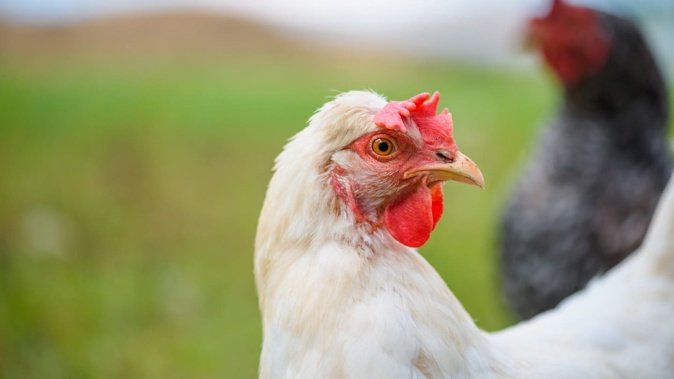
No sign of the high pathogenic avian influenza (HPAI)has been found on a second Otago farm, Biosecurity New Zealand has found.
Test results to date from a small free-range layer chicken farm near Dunedin are negative for HPAI.
Earlier this week, 80,000 birds were required to be euthanised on a Hillgrove, Otago farm operated by Mainland Poultry after two flocks were exposed to the virus.
Testing and monitoring continues to show no signs yet of disease on five chicken farms also operated by Mainland Poultry and linked to its Hillgrove site, Biosecurity New Zealand’s deputy director-general Stuart Anderson says.
The farm at the centre of the outbreak. Photo / Ben Tomsett
On Tuesday, Biosecurity New Zealand put a precautionary restricted place notice on the Dunedin farm, stopping the movement of material on and off the property, after some of its estimated 6,000 birds died.
”We’ve tested a number of samples from the Dunedin farm and if HPAI was present we would have expected to see it in most of them, but we haven’t found any.
”The results will be welcome news for the farmer and we would like to acknowledge their efforts in reporting the deaths and working with our staff.
”At this stage, we believe the issues on the farm are caused by an existing New Zealand disease among the birds and we will work with the farm to identify what it is and provide support.”
A digger arrives at the farm this morning. Photo / Ben Tomsett
Anderson says the precautionary biosecurity controls put on the property earlier in the week will remain in place for now while more testing is carried out to determine the cause of illness.
Meanwhile, the depopulation of chickens continues at the Mainland Poultry farm at Hillgrove, Otago, which remains under strict controls.
Anderson says to date, there have been no signs of production loss or ill birds at Mainland Poultry’s five other properties in the area.
”The Ministry for Primary Industries’ enhanced PC3 laboratory at Wallaceville in Wellington continues to steadily work through hundreds of samples at a time and it’s good news that we’ve not found any other infection yet.
”We’ve moved quickly in the past week to put in restrictions, investigate, track, and test, and I thank the farmers involved and our industry partners for their help – together we’ve made strong progress.”
Anderson says Biosecurity New Zealand will continue its rigorous testing of samples due to the disease’s incubation period, which is usually three to 14 days, but can be up to 21 days.
”Steady progress is being made to depopulate chickens in two sheds at the Hillgrove egg farm and dispose of them safely at a secure landfill designed for such purposes.”
Anderson says teams are also on-the-ground visiting properties within Biosecurity New Zealand’s 10-kilometre enhanced surveillance zone around Hillgrove, with support from the regional control centre set up to help response efforts.
”Our staff are visiting landowners that own poultry, including commercial and back yard, to provide helpful information on best biosecurity practices, signs of HPAI to look out for, and how to report these to MPI’s pest and disease hotline.
”We remain confident that we are on the right track to stamping out H7N6.”
Anderson reminded people the risk to human health remains low, and there are no concerns for food safety or wildlife.
”Avian influenza viruses are killed by cooking, so it remains safe to eat thoroughly cooked egg and poultry product.
”Raw eggs have always been considered a high-risk food. Our advice remains not to consume or serve raw eggs, especially to those with low or compromised immune systems, as the eggs may contain harmful pathogens.”
Sign up to The Daily H, a free newsletter curated by our editors and delivered straight to your inbox every weekday.
Take your Radio, Podcasts and Music with you








